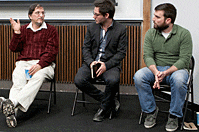
The University of Virginia (U.Va.) Food Collaborative, a group of people in the U.Va. community who work to promote research, teaching and community engagement about issues surrounding food, agriculture and sustainability, sponsored the screening of "The End of the Line," a film about the decline of world fisheries. It was followed by a discussion with Steven Macko, an environmental sciences professor in the College of Arts & Sciences, and U.Va. graduate students Jack Cochran and Doug Dickerson, who started the Charlottesville Community Supported Fishery.
The film showed that modern fishing practices have outpaced the rate at which fish replicate, forcing many species like the bluefin tuna onto the endangered species list and causing the global fish catch to sharply decline.
It depicted the many environmental hazards related to mass commercial fishing such as trawling, which Macko said has turned large areas of the ocean floors into biological deserts. The film posited the belief of some scientists that if the current method of unsustainable fishing continues, humans' supplies of edible fish could be depleted by the year 2050.
Audience members had much to say about the film, good and bad. Chris Arseneault, who owns Seafood@WestMain in Charlottesville, noted that the movie only included about 10 minutes of optimism. "I'm depressed looking at that film despite what I know and my optimistic nature," he said.
One student compared marine reserves – areas where fishing has been banned in hopes of allowing fish to naturally repopulate – to a swath of managed land near his home. He said that marine reserves, like forest reserves, can allow humans to mitigate use of their natural resources without abandoning them entirely.
The panelists were impressed with the knowledge of the audience and the level of discourse. "This was a well-informed audience," said Dickerson, a graduate architecture student who earned his undergraduate degree at U.Va. "They knew the right questions to ask."
The film also depicted economic consequences of ecosystem collapse, present and past, such as what occurred in the wake of the Canadian government's shutdown of the cod fishing industry in Newfoundland. Macko, who lived in Newfoundland at that time, said that after 400 years of fishing, a large percentage of the 500,000-person population lost their jobs overnight in an attempt to salvage the species. "There's a saying: Desperate times call for desperate measures," Macko said. He noted that in recent years, fishing for the popular rockfish, better known as striped bass, in the Chesapeake Bay was also shut down.
One of the discussed alternatives to wild sea fishing is aquaculture, the cultivation of fish like catfish, tilapia and shrimp in farms. Another alternative technique for fish production is aquaponics, a kind of polyculture that grows different levels of the food chain in ways that draw on one another. In aquaponics, fish eat plants that grow in water tanks and in return the fish excrement fertilizes the plants, similar to how a cow eats hay and then provides the fertilizer to allow more hay to grow. But since no system is perfect, antibiotics, supplemental vitamins and proteins often have to be added to the tanks and waste must be disposed of, processes which cause health concerns for some.
Cochran and Dickerson created Charlottesville CSF after working on a project in architecture professor Timothy Beatley's "Sustainable Communities" course. They helped a co-op of Virginia farmers, who were transitioning from tobacco to freshwater pond fish farming, to market their fish in a new way, with community members placing orders in advance – much the way one would subscribe to a magazine. This model both helps support local farmers who employ sustainable fishing practices and educates consumers about, and connects them to, their food source.
"Our initiative was both to provide Charlottesville residents with locally, sustainably sourced fish while directly supporting local farmers and meeting their needs" such as the expenses of being sustainable and small-scale, said Cochran, who will graduate next year with master's degrees in urban and environmental planning and architecture.
Cochran and Dickerson are writing their theses on the incorporation of food systems into urban design.
"I don't think urban agriculture is the answer by itself but like to think it can contribute in its small way and support the larger system," Cochran said. "I think we need to be more interdisciplinary, to work in policy and business, instead of just designing a building."
March 2012
